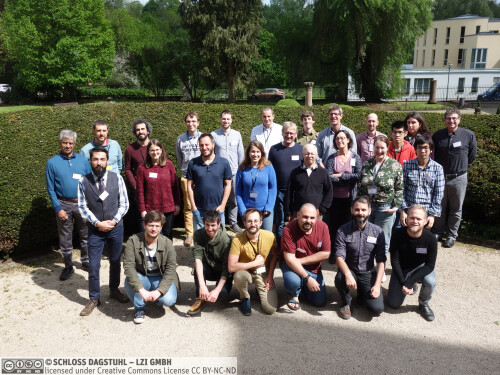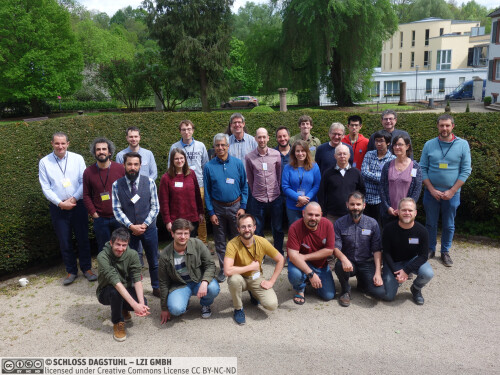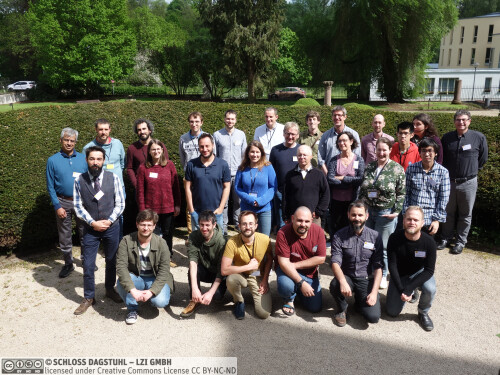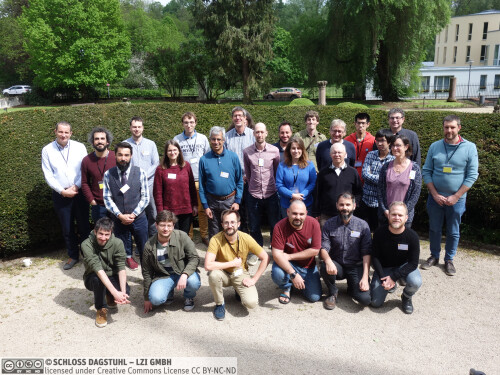Dagstuhl Seminar 23202
Regular Transformations
( May 14 – May 17, 2023 )
Permalink
Organizers
- Rajeev Alur (University of Pennsylvania - Philadelphia, US)
- Mikolaj Bojanczyk (University of Warsaw, PL)
- Emmanuel Filiot (UL - Brussels, BE)
- Anca Muscholl (University of Bordeaux, FR)
Contact
- Michael Gerke (for scientific matters)
- Susanne Bach-Bernhard (for administrative matters)
Shared Documents
- Dagstuhl Materials Page (Use personal credentials as created in DOOR to log in)
Schedule
Transducers, i.e. automata with outputs, are one of the oldest computational models in theoretical computer science. They even predate the usual boolean automata, going back to Church, Shannon, Moore, and Mealy. In spite of being considered too complex (Rabin and Scott argued in their 1959 paper that they are better off by “doing away with a complicated output function and having our machines simply give ‘yes’ or ‘no’ answers.”), transducers remained an active research topic ever since. Also connections to practical applications in efficient processing of streaming data have been established recently. The purpose of this Dagstuhl Seminar was to gather researchers to discuss recent developments on transducers and their applications.
The goal was twofold, to advance on a list of topics about transducers that have gathered much interest recently, and to explore new connections with researchers from linguistics. We enjoyed very interesting talks about:
- polyregular functions over trees and growth of regular functions
- data transducer synthesis and transducers over data words
- decomposition of finite-valued streaming string transducers
- automata over series-parallel graphs and transducers for data management
- learning linguistic transformations and large language models as transducers
- tree transducers: class characterisations, macro tree transducers with semantic constraints
- transducers and complexity
The scientific programme was quite dense, given that we had only 3 days and almost all participants proposed to give a talk. Exchanges were very lively, and we are confident that new research directions and new collaborations emerged from this seminar.
 Rajeev Alur, Mikolaj Bojanczyk, Emmanuel Filiot, and Anca Muscholl
Rajeev Alur, Mikolaj Bojanczyk, Emmanuel Filiot, and Anca Muscholl
Transducers, i.e., automata that output values other than just “yes” or “no”, are one of the oldest computational models in theoretical computer science. They even predate the usual automata, with Rabin and Scott arguing in their 1959 paper that they are better off by “doing away with a complicat-ed output function and having our machines simply give ‘yes’ or ‘no’ answers.” Despite this impres-sive pedigree, transducers have remained an active research topic ever since. Also, connections to practical applications in efficient processing of streaming data have been established recently. The purpose of this Dagstuhl Seminar is to gather researchers working on these topics to discuss recent developments.
We plan to discuss and advance on the following non-exhaustive list of topics during the seminar:
- regular and polyregular functions: the class of regular string-to-string functions has now gained a central position in the theory of transducers, as witnessed by many recent developments. The semi-nar will discuss those developments as well as classes of functions beyond regular functions, and in particular models of functions of polynomial growth, which have received a lot of attention in the last years.
- equivalence problems: transducer equivalence is one of the most central algorithmic problems in transducer theory. Algebraic techniques have been used recently to tackle this problem but important questions remain, such as whether or not the equivalence problem is decidable for polyregular functions.
- with finite model theory: the last decade has seen an explosion of new work on the theory of graph classes where first-order model checking is tractable (first-order model checking is not tractable on the class of all graphs). A recent trend in this work has been to use transducers, by considering images of simple graphs under certain transducers, or by considering classes that cannot yield all graphs by applying certain transducers.
- semantics: origin semantics means tagging the output by the positions of the input that generated that output. Origin semantics has shed new lights on algebraic characterizations of regu-lar functions and equivalence problems for transducers.
- membership problems: unlike deterministic finite automata, transducers are not robust under natural extensions such as non-determinism, bidirectionality, pebbles, … This induces classes of functions of various expressive power. Class membership problems, which ask to decide whether a function given as a transducer in some class belongs to some other class, have seen important de-velopments in the last few years.
 Rajeev Alur, Mikolaj Bojanczyk, Emmanuel Filiot, and Anca Muscholl
Rajeev Alur, Mikolaj Bojanczyk, Emmanuel Filiot, and Anca Muscholl
- Shaull Almagor (Technion - Haifa, IL) [dblp]
- Rajeev Alur (University of Pennsylvania - Philadelphia, US) [dblp]
- Mikolaj Bojanczyk (University of Warsaw, PL) [dblp]
- Elisabet Burjons (York University - Toronto, CA) [dblp]
- Michaël Cadilhac (DePaul University - Chicago, US) [dblp]
- Olivier Carton (Université Paris Cité, FR) [dblp]
- Ryan Cotterell (ETH Zürich, CH) [dblp]
- Luc Dartois (University Paris-Est - Créteil, FR) [dblp]
- Gaëtan Douéneau-Tabot (Université Paris Cité, FR) [dblp]
- Léo Exibard (Gustave Eiffel University - Marne-la-Vallée, FR) [dblp]
- Emmanuel Filiot (UL - Brussels, BE) [dblp]
- Paul Gallot (Universität Bremen, DE)
- Matthew Hague (Royal Holloway, University of London, GB) [dblp]
- Jeffrey Heinz (Stony Brook University, US) [dblp]
- Ismaël Jecker (University of Warsaw, PL) [dblp]
- Sandra Kiefer (University of Oxford, GB) [dblp]
- Nathan Lhote (Aix-Marseille University, FR) [dblp]
- Sebastian Maneth (Universität Bremen, DE) [dblp]
- Anca Muscholl (University of Bordeaux, FR) [dblp]
- Le Thanh Düng Nguyen (ENS - Lyon, FR) [dblp]
- Cécilia Pradic (Swansea University, GB) [dblp]
- Gabriele Puppis (University of Udine, IT) [dblp]
- Jon Rawski (San José State University, US) [dblp]
- Cristian Riveros (PUC - Santiago de Chile, CL) [dblp]
- Helmut Seidl (TU München - Garching, DE) [dblp]
- Rafal Stefanski (University College London, GB) [dblp]
- Martin Vu (Universität Bremen, DE)
- Sarah Winter (UL - Brussels, BE) [dblp]
Related Seminars
Classification
- Databases
- Formal Languages and Automata Theory
- Logic in Computer Science
Keywords
- transducers
- automata with outputs
- transformations





 Creative Commons BY 4.0
Creative Commons BY 4.0
